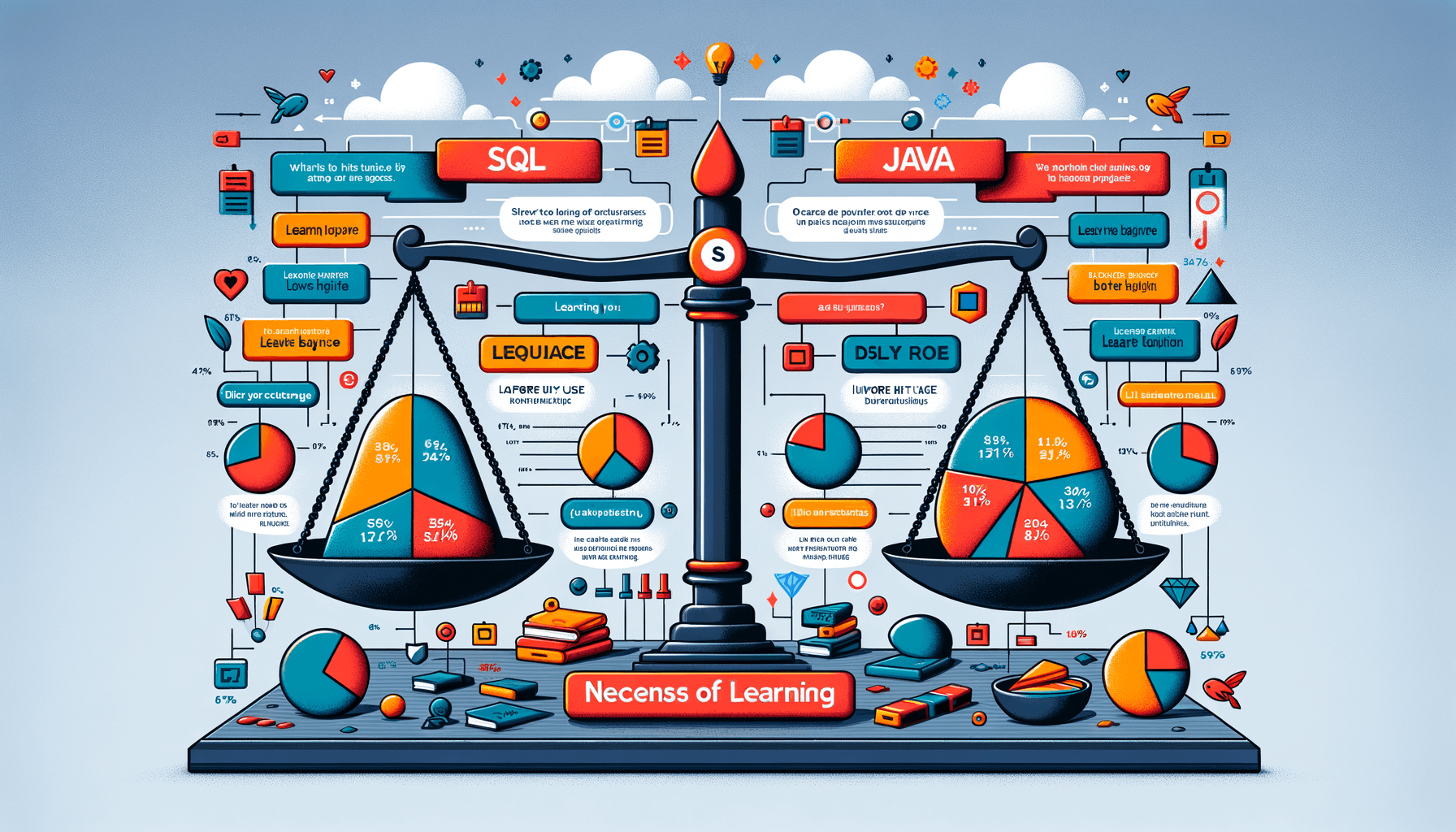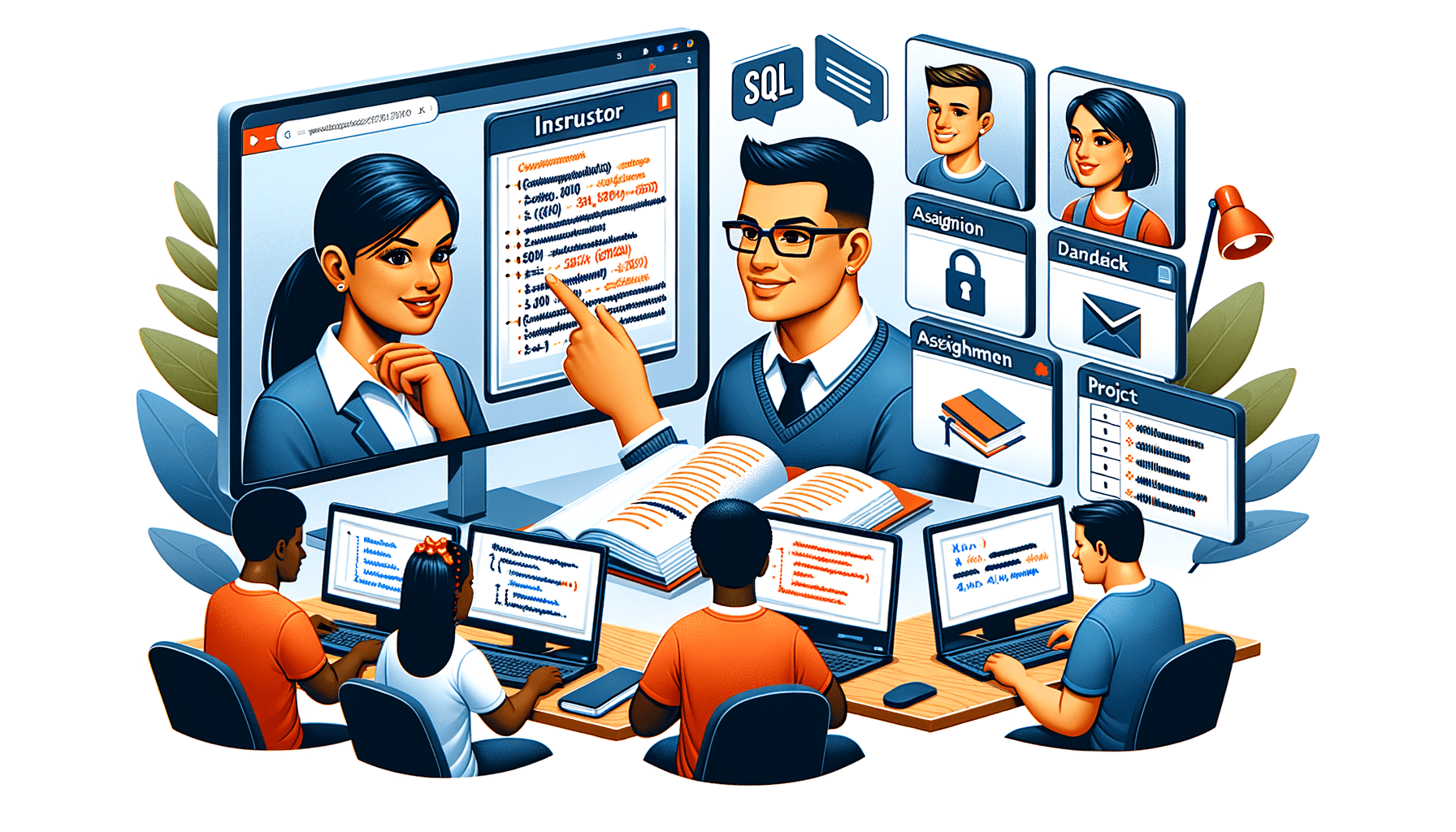A big variety of articles and resources

Is it necessary to learn SQL before Java?
 Sia Author and Instructor
Learn SQL
Sia Author and Instructor
Learn SQL
14 minute read
When starting to learn programming, choosing which language to learn first can be tough. Some people say learning SQL before Java is better, while others think the opposite. This article will help you understand the roles of SQL and Java, and which one might be better to start with.
Key Takeaways
- SQL is important for managing and handling data in many software projects.
- Java is a flexible programming language used in many areas, from mobile apps to big enterprise systems.
- SQL and Java are different: SQL is about asking databases for information, while Java is about creating programs.
- Learning SQL can help you understand how data works, which is useful for many programming tasks.
- Starting with Java can give you a strong base in programming concepts, which can make learning other languages easier.
The Role of SQL in Modern Software Development
Understanding Data Management
In today's software landscape, managing data efficiently is crucial. SQL, or Structured Query Language, is the backbone of data management. It allows us to store, retrieve, and manipulate data in relational databases. Without SQL, handling large volumes of data would be nearly impossible. We use SQL to ensure data integrity and to perform complex queries that help in decision-making.
SQL in Web Development
Web development relies heavily on SQL for backend data operations. When we build web applications, we often need to interact with databases to store user information, manage content, and track activities. SQL enables us to perform these tasks seamlessly. For example, when a user logs in, SQL queries check their credentials against stored data. This makes SQL an essential skill for web developers.
SQL in Enterprise Applications
In enterprise settings, SQL is indispensable. Large organizations use SQL to manage vast amounts of data across various departments. From customer relationship management (CRM) systems to enterprise resource planning (ERP) software, SQL plays a key role. It helps in generating reports, analyzing trends, and making data-driven decisions. Mastering SQL can significantly enhance our ability to develop and maintain enterprise-level applications.
Java: A Versatile Programming Language
Java in Software Development
Java is a cornerstone in the world of software development. Its platform independence makes it a favorite among developers. Write once, run anywhere is a principle that has driven its widespread adoption. Java's robust libraries and frameworks simplify complex tasks, making it easier for us to build reliable applications.
Java for Mobile Applications
In the realm of mobile applications, Java holds a significant place. Android development, in particular, relies heavily on Java. The language's object-oriented nature allows for modular and maintainable code, which is crucial for mobile app development. We can create dynamic and responsive applications that cater to a wide range of users.
Java in Enterprise Solutions
Java is also a key player in enterprise solutions. Its scalability and security features make it ideal for large-scale applications. Many businesses trust Java for their backend systems, ensuring smooth and secure operations. The language's versatility allows us to integrate various technologies, providing comprehensive solutions for complex business needs.
Java's adaptability and extensive ecosystem make it an essential tool in modern software development. From mobile apps to enterprise systems, its applications are vast and varied.
Comparing SQL and Java: Core Differences
Declarative vs. Imperative Paradigms
When we look at SQL and Java, we see two very different ways of thinking. SQL is a declarative language, which means we tell the computer what we want, and it figures out how to get it. On the other hand, Java is an imperative language, where we give the computer step-by-step instructions. This difference shapes how we write and understand code in each language.
Use Cases and Applications
SQL is mainly used for managing and querying databases. It's great for tasks like retrieving data, updating records, and handling large datasets. Java, however, is a general-purpose programming language. We use it to build applications, from web services to mobile apps. Each language shines in its own area, making them both valuable in different scenarios.
Learning Curves
Learning SQL can be straightforward, especially if we focus on basic commands and queries. However, mastering it requires practice with real-world problems and hands-on projects. Java, with its complex syntax and concepts like object-oriented programming, can be more challenging. But with effort and the right training, we can become proficient in both. Effort required for success is a common theme in learning any new skill.
Understanding the core differences between SQL and Java helps us choose the right tool for the job and plan our learning path effectively.
Learning SQL: Foundational Concepts
Basic SQL Syntax
When we start learning SQL, the first thing we need to understand is its basic syntax. SQL, or Structured Query Language, is used to communicate with databases. We write commands to perform tasks like retrieving data or updating records. A quick introduction to SQL for beginners can be very helpful. For example, the SELECT statement is used to fetch data from a database, while the INSERT statement adds new data.
Database Design Principles
Understanding how to design a database is crucial. We need to know how to organize data efficiently. This involves creating tables, defining relationships, and ensuring data integrity. Good design helps in making the database more efficient and easier to manage. We often start with a foundation in database concepts, which includes understanding primary keys, foreign keys, and normalization.
Data Manipulation and Querying
Once we have a database set up, we need to know how to manipulate and query the data. This includes using commands like UPDATE to change existing data and DELETE to remove data. Practical learning and hands-on projects are essential for mastering these skills. We also learn how to use JOIN operations to combine data from multiple tables, which is a powerful feature of SQL.
Learning SQL is a step-by-step process that builds on each concept. Starting with the basics and gradually moving to more complex topics helps in solidifying our understanding.
Learning Java: Foundational Concepts
Java Syntax and Semantics
When we start learning Java, the first thing we need to understand is its syntax and semantics. Java's syntax is similar to other programming languages like C++ and C#, making it easier for those with some coding background. The semantics, or the meaning behind the code, is what makes Java unique. Understanding these basics helps us write clear and efficient programs.
Object-Oriented Programming
Java is known for its strong support for object-oriented programming (OOP). In OOP, we use objects to represent real-world entities. This approach makes our code more modular and easier to manage. We can create classes, which are blueprints for objects, and use inheritance, polymorphism, and encapsulation to build complex applications.
Exception Handling and Multithreading
Handling errors gracefully is crucial in any programming language, and Java provides robust mechanisms for exception handling. We can use try-catch blocks to manage errors and ensure our programs run smoothly. Additionally, Java supports multithreading, allowing us to run multiple threads simultaneously. This feature is essential for developing high-performance applications.
Mastering these foundational concepts in Java sets the stage for more advanced topics and real-world applications. By focusing on syntax, OOP principles, and error handling, we build a strong base for our programming journey.
Interdependence of SQL and Java in Application Development
Database Connectivity
In modern software development, connecting Java applications to databases is crucial. Java Database Connectivity (JDBC) is a standard API that allows Java programs to interact with various databases using SQL. This connection enables us to perform essential operations like querying, updating, and managing data.
Data Persistence
Data persistence refers to the ability of data to outlast the process that created it. In Java applications, we often use SQL databases to store data persistently. This ensures that the data remains available even after the application is closed or restarted. By using SQL, we can efficiently manage and retrieve this data whenever needed.
ORM Frameworks
Object-Relational Mapping (ORM) frameworks, such as Hibernate, bridge the gap between Java objects and SQL databases. These frameworks allow us to map Java classes to database tables, making it easier to perform database operations without writing extensive SQL code. This not only simplifies development but also enhances code maintainability.
Understanding the interdependence of SQL and Java is essential for building robust and efficient applications. By leveraging the strengths of both technologies, we can create solutions that are both powerful and scalable.
Educational Pathways: SQL Before Java
Curriculum Structures
When planning a learning path, starting with SQL can be beneficial. Many educational programs offer courses that focus on SQL first. This approach helps students grasp the basics of data management early on. For instance, platforms like sqlskillz.com vs w3schools.com: master sql basics, perfect for beginners, learn at your own pace. no credit card required. login or sign up to start learning. provide excellent resources for beginners.
Sequential Learning Benefits
Learning SQL before Java can offer several advantages. Understanding data management concepts early can make it easier to handle databases when you start coding in Java. This sequential learning helps in building a strong foundation, making the transition to Java smoother.
Case Studies
Several case studies highlight the benefits of learning SQL first. For example, students who start with SQL often find it easier to understand how databases work when they move on to Java. This approach not only boosts their confidence but also enhances their problem-solving skills.
Starting with SQL can provide a solid foundation for understanding data management, which is crucial for effective Java programming later on.
Educational Pathways: Java Before SQL
Curriculum Structures
When we look at learning Java before SQL, we often see a different approach in educational programs. Many curriculums start with Java because it introduces students to programming concepts and logic. This foundation can make it easier to understand SQL later on. Java's syntax and structure help students grasp the basics of coding, which is essential for any software development role.
Sequential Learning Benefits
Starting with Java can offer several benefits. First, it builds a strong base in programming. Once students are comfortable with Java, they can move on to SQL with more confidence. This sequence can make the learning process smoother and more logical. Additionally, understanding Java first can help students see how SQL fits into larger applications, making it easier to understand its role in data management.
Case Studies
There are many examples of successful learning pathways where students started with Java before moving on to SQL. For instance, in some coding bootcamps, students begin with Java to learn programming fundamentals. After mastering Java, they transition to SQL to handle data management tasks. This approach has proven effective in preparing students for real-world projects and collaborative development environments.
Learning Java first can provide a solid foundation for understanding more complex topics later on. It helps students build problem-solving skills that are crucial for both programming and data management.
In summary, starting with Java can offer a structured and effective way to learn programming and data management. It prepares students for the challenges of software development and helps them understand the interdependence of different technologies.
Industry Perspectives on Learning SQL and Java
In today’s job market, understanding both SQL and Java is often seen as a significant advantage. Employers frequently look for candidates who can handle both data management and programming tasks. This dual skill set allows us to tackle a wider range of projects and challenges.
When we analyze job postings, we notice a trend: many positions require knowledge of both SQL and Java. Here’s a quick overview of the skills employers are seeking:
| Skill Set | Percentage of Job Listings |
|---|---|
| SQL | 70% |
| Java | 65% |
| Both SQL and Java | 50% |
This data shows that having skills in both areas can make us more competitive in the job market.
- Employer Expectations: Many companies expect developers to understand how to interact with databases using SQL while also being able to write applications in Java.
- Job Market Trends: The demand for professionals who can bridge the gap between data and application development is growing.
- Skill Set Synergies: Learning SQL can enhance our Java programming skills, especially when it comes to data-driven applications.
In summary, mastering both SQL and Java not only broadens our career opportunities but also equips us with the tools to solve complex problems in software development.
By focusing on both languages, we position ourselves as versatile developers ready to meet the needs of modern businesses.
Additionally, as we progress in our careers, the ability to work with both SQL and Java can lead to more advanced roles, such as database administrator or full-stack developer, where these skills are essential.
Practical Applications of SQL and Java Skills
Real-World Projects
When we work on real-world projects, we often need both SQL and Java. For example, a web application might use SQL to manage the database and Java to handle the server-side logic. Combining these skills allows us to build more complete and efficient applications.
Collaborative Development
In team settings, knowing both SQL and Java helps us collaborate better. We can understand the full stack of the application, from the database to the user interface. This makes it easier to communicate with team members and solve problems together.
Problem-Solving Scenarios
Using SQL and Java together can help us solve complex problems. For instance, we might use SQL to quickly find data and Java to process it. This combination is powerful for tasks like data analysis and reporting.
Mastering both SQL and Java opens up many opportunities in software development. We can tackle a wider range of projects and work more effectively in teams.
Resources for Learning SQL and Java
Online Courses and Tutorials
For those starting out, online courses are a great way to learn. Platforms like Coursera and Udemy offer a variety of courses. For example, the Data Analyst - Introduction to SQL course offers hands-on projects, personalized support, and industry best practices. Instructor Eric Vanier specializes in SQL, database performance, and education.
Books and Publications
Books are another excellent resource. Titles like "Head First SQL" and "Effective Java" provide in-depth knowledge. These books cover everything from basic concepts to advanced techniques. They are perfect for both beginners and experienced learners.
Community and Support Networks
Joining a community can be very helpful. Online forums like Stack Overflow and GitHub are great places to ask questions and share knowledge. These platforms offer a wealth of information and support from fellow learners and professionals.
Looking to master SQL and Java? Our website offers a variety of courses designed to help you learn these essential skills. Whether you're a beginner or looking to advance your knowledge, we have something for everyone. Visit us today to explore our course catalog and start your learning journey!
Conclusion
In summary, whether you should learn SQL before Java depends on your goals and interests. If you are interested in managing databases or working with data, starting with SQL might be more beneficial. On the other hand, if you are keen on building applications or software, Java could be the better starting point. Both languages have their own strengths and learning either one will provide valuable skills. Ultimately, the choice is yours and should align with what you want to achieve in your career or personal projects.
Frequently Asked Questions
Do I need to learn SQL before Java?
No, you don't have to learn SQL before Java. Both languages serve different purposes and can be learned independently.
What is SQL used for?
SQL is used for managing and querying databases. It's great for handling data.
What can I do with Java?
With Java, you can build all sorts of applications, from mobile apps to large enterprise systems.
Is SQL harder to learn than Java?
It depends on your background. Some people find SQL easier because it's more about data. Others find Java easier because it's more about logic and problem-solving.
Can I learn SQL and Java at the same time?
Yes, you can learn both at the same time. They complement each other well in many applications.
Which one is more important for getting a job?
Both SQL and Java are important. The demand for each depends on the job role and industry.
How long does it take to learn SQL?
It usually takes a few weeks to get the basics of SQL. Becoming proficient can take a few months.
How long does it take to learn Java?
Learning the basics of Java can take a few weeks. Mastering it can take several months or even years.
Related Articles

Can I start career as SQL devloper at age of 35 as single?
13 minute read

Discover the Best Online SQL Course for Your Data Needs
9 minute read

Get Certified with Our SQL Online Course
8 minute read




